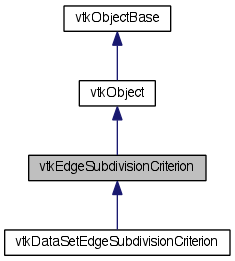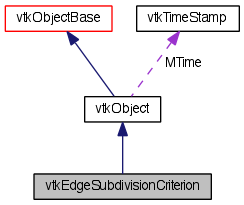how to decide whether a linear approximation to nonlinear geometry or field should be subdivided More...
#include <vtkEdgeSubdivisionCriterion.h>


Public Types | |
| typedef vtkObject | Superclass |
Public Member Functions | |
| virtual int | IsA (const char *type) |
| vtkEdgeSubdivisionCriterion * | NewInstance () const |
| virtual void | PrintSelf (ostream &os, vtkIndent indent) |
| virtual bool | EvaluateEdge (const double *p0, double *p1, const double *p2, int field_start)=0 |
| virtual int | PassField (int sourceId, int sourceSize, vtkStreamingTessellator *t) |
| virtual void | ResetFieldList () |
| virtual bool | DontPassField (int sourceId, vtkStreamingTessellator *t) |
| const int * | GetFieldIds () const |
| const int * | GetFieldOffsets () const |
| int | GetOutputField (int fieldId) const |
| int | GetNumberOfFields () const |
Static Public Member Functions | |
| static int | IsTypeOf (const char *type) |
| static vtkEdgeSubdivisionCriterion * | SafeDownCast (vtkObjectBase *o) |
Protected Member Functions | |
| virtual vtkObjectBase * | NewInstanceInternal () const |
| vtkEdgeSubdivisionCriterion () | |
| virtual | ~vtkEdgeSubdivisionCriterion () |
| bool | ViewDependentEval (const double *p0, double *p1, double *p1_actual, const double *p2, int field_start, vtkMatrix4x4 *viewtrans, const double *pixelSize, double allowableChordErr) const |
| bool | FixedFieldErrorEval (const double *p0, double *p1, double *p1_actual, const double *p2, int field_start, int field_criteria, double *allowableFieldErr) const |
Protected Attributes | |
| int * | FieldIds |
| int * | FieldOffsets |
| int | NumberOfFields |
Detailed Description
how to decide whether a linear approximation to nonlinear geometry or field should be subdivided
$Date$ $Revision$
Descendants of this abstract class are used to decide whether a piecewise linear approximation (triangles, lines, ... ) to some nonlinear geometry should be subdivided. This decision may be based on an absolute error metric (chord error) or on some view-dependent metric (chord error compared to device resolution) or on some abstract metric (color error). Or anything else, really. Just so long as you implement the EvaluateEdge member, all will be well.
- See also:
- vtkDataSetSubdivisionAlgorithm vtkStreamingTessellator
Definition at line 47 of file vtkEdgeSubdivisionCriterion.h.
Member Typedef Documentation
Reimplemented from vtkObject.
Reimplemented in vtkDataSetEdgeSubdivisionCriterion.
Definition at line 50 of file vtkEdgeSubdivisionCriterion.h.
Constructor & Destructor Documentation
| vtkEdgeSubdivisionCriterion::vtkEdgeSubdivisionCriterion | ( | ) | [protected] |
| virtual vtkEdgeSubdivisionCriterion::~vtkEdgeSubdivisionCriterion | ( | ) | [protected, virtual] |
Member Function Documentation
| static int vtkEdgeSubdivisionCriterion::IsTypeOf | ( | const char * | name | ) | [static] |
Return 1 if this class type is the same type of (or a subclass of) the named class. Returns 0 otherwise. This method works in combination with vtkTypeMacro found in vtkSetGet.h.
Reimplemented from vtkObject.
Reimplemented in vtkDataSetEdgeSubdivisionCriterion.
| virtual int vtkEdgeSubdivisionCriterion::IsA | ( | const char * | name | ) | [virtual] |
Return 1 if this class is the same type of (or a subclass of) the named class. Returns 0 otherwise. This method works in combination with vtkTypeMacro found in vtkSetGet.h.
Reimplemented from vtkObject.
Reimplemented in vtkDataSetEdgeSubdivisionCriterion.
| static vtkEdgeSubdivisionCriterion* vtkEdgeSubdivisionCriterion::SafeDownCast | ( | vtkObjectBase * | o | ) | [static] |
Reimplemented from vtkObject.
Reimplemented in vtkDataSetEdgeSubdivisionCriterion.
| virtual vtkObjectBase* vtkEdgeSubdivisionCriterion::NewInstanceInternal | ( | ) | const [protected, virtual] |
Reimplemented from vtkObject.
Reimplemented in vtkDataSetEdgeSubdivisionCriterion.
Reimplemented from vtkObject.
Reimplemented in vtkDataSetEdgeSubdivisionCriterion.
| virtual void vtkEdgeSubdivisionCriterion::PrintSelf | ( | ostream & | os, |
| vtkIndent | indent | ||
| ) | [virtual] |
Methods invoked by print to print information about the object including superclasses. Typically not called by the user (use Print() instead) but used in the hierarchical print process to combine the output of several classes.
Reimplemented from vtkObject.
Reimplemented in vtkDataSetEdgeSubdivisionCriterion.
| virtual bool vtkEdgeSubdivisionCriterion::EvaluateEdge | ( | const double * | p0, |
| double * | p1, | ||
| const double * | p2, | ||
| int | field_start | ||
| ) | [pure virtual] |
You must implement this member function in a subclass. It will be called by vtkStreamingTessellator for each edge in each primitive that vtkStreamingTessellator generates.
Implemented in vtkDataSetEdgeSubdivisionCriterion.
| virtual int vtkEdgeSubdivisionCriterion::PassField | ( | int | sourceId, |
| int | sourceSize, | ||
| vtkStreamingTessellator * | t | ||
| ) | [virtual] |
This is a helper routine called by PassFields() which you may also call directly; it adds sourceSize to the size of the output vertex field values. The offset of the sourceId field in the output vertex array is returned. -1 is returned if sourceSize would force the output to have more than vtkStreamingTessellator::MaxFieldSize field values per vertex.
| virtual void vtkEdgeSubdivisionCriterion::ResetFieldList | ( | ) | [virtual] |
Don't pass any field values in the vertex pointer. This is used to reset the list of fields to pass after a successful run of vtkStreamingTessellator.
| virtual bool vtkEdgeSubdivisionCriterion::DontPassField | ( | int | sourceId, |
| vtkStreamingTessellator * | t | ||
| ) | [virtual] |
This does the opposite of PassField(); it removes a field from the output (assuming the field was set to be passed). Returns true if any action was taken, false otherwise.
| const int * vtkEdgeSubdivisionCriterion::GetFieldIds | ( | ) | const [inline] |
Return the map from output field id to input field ids. That is, field i of any output vertex from vtkStreamingTessellator will be associated with GetFieldIds()[i] on the input mesh.
Definition at line 157 of file vtkEdgeSubdivisionCriterion.h.
| const int * vtkEdgeSubdivisionCriterion::GetFieldOffsets | ( | ) | const [inline] |
Return the offset into an output vertex array of all fields. That is, field i of any output vertex, p, from vtkStreamingTessellator will have its first entry at p[GetFieldOffsets()[i] ] .
Definition at line 158 of file vtkEdgeSubdivisionCriterion.h.
| int vtkEdgeSubdivisionCriterion::GetOutputField | ( | int | fieldId | ) | const |
Return the output ID of an input field. Returns -1 if fieldId is not set to be passed to the output.
| int vtkEdgeSubdivisionCriterion::GetNumberOfFields | ( | ) | const [inline] |
Return the number of fields being evaluated at each output vertex. This is the length of the arrays returned by GetFieldIds() and GetFieldOffsets().
Definition at line 159 of file vtkEdgeSubdivisionCriterion.h.
| bool vtkEdgeSubdivisionCriterion::ViewDependentEval | ( | const double * | p0, |
| double * | p1, | ||
| double * | p1_actual, | ||
| const double * | p2, | ||
| int | field_start, | ||
| vtkMatrix4x4 * | viewtrans, | ||
| const double * | pixelSize, | ||
| double | allowableChordErr | ||
| ) | const [protected] |
Perform the core logic for a view-dependent subdivision. Returns true if subdivision should occur, false otherwise. This is to be used by subclasses once the mesh-specific evaluation routines have been called to get the actual (as opposed to linearly interpolated) midpoint coordinates. Currently, this handles only geometry, but could conceivably test scalar fields as well.
- Parameters:
-
p0 is the first endpoint of the edge p1 is the linearly interpolated midpoint of the edge p1_actual is the actual midpoint of the edge p2 is the second endpoint of the edge field_start is the offset into the above arrays indicating where the scalar field values start (when isosurfacing, the embedding dimension may be smaller than the number of parametric coordinates). viewtrans is the viewing transform (from model to screen coordinates). Applying this transform to p0, p1, etc., should yield screen-space coordinates. pixelSize is the width and height of a pixel in screen space coordinates. allowableChordErr is the maximum allowable distance between p1 and p1_actual, in multiples of pixelSize, before subdivision will occur.
| bool vtkEdgeSubdivisionCriterion::FixedFieldErrorEval | ( | const double * | p0, |
| double * | p1, | ||
| double * | p1_actual, | ||
| const double * | p2, | ||
| int | field_start, | ||
| int | field_criteria, | ||
| double * | allowableFieldErr | ||
| ) | const [protected] |
Perform the core logic for a fixed multi-criterion, scalar-field based subdivision. Returns true if subdivision should occur, false otherwise. This is to be used by subclasses once the mesh-specific evaluation routines have been called to get the actual (as opposed to linearly interpolated) midpoint geometry and field values. Only field values are tested (not geometry) because you can save yourself field evaluations if you check the geometry yourself and it fails the test.
- Parameters:
-
p0 is the first endpoint of the edge p1 is the linearly interpolated midpoint of the edge p1_actual is the actual midpoint of the edge p2 is the second endpoint of the edge field_start is the offset into the above arrays indicating where the scalar field values start (when isosurfacing, the embedding dimension may be smaller than the number of parametric coordinates). field_criteria is a bitfield specifying which fields (of the fields specified by PassField or PassFields) are to be considered for subdivision. Thus, you may pass fields to the output mesh without using them as subdivision criteria. In than case, the allowableFieldErr will have an empty entry for those fields. allowableFieldErr is an array of tolerances, one for each field passed to the output. If the linearly interpolated and actual midpoint values for any field are greater than the value specified here, the member will return true.
Member Data Documentation
int* vtkEdgeSubdivisionCriterion::FieldIds [protected] |
Definition at line 100 of file vtkEdgeSubdivisionCriterion.h.
int* vtkEdgeSubdivisionCriterion::FieldOffsets [protected] |
Definition at line 101 of file vtkEdgeSubdivisionCriterion.h.
int vtkEdgeSubdivisionCriterion::NumberOfFields [protected] |
Definition at line 102 of file vtkEdgeSubdivisionCriterion.h.
The documentation for this class was generated from the following file:
- dox/Filters/Core/vtkEdgeSubdivisionCriterion.h
 1.8.0
1.8.0